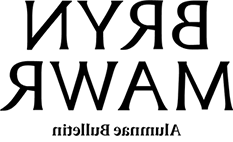
欢迎来到工作周
A 布林莫尔 graduate offers her take on how current students need to best prepare for success.
每年, 校友/我返回校园, 领导层的礼遇, 创新, 和文科中心(LILAC), to meet with students for talks about career and the world outside the 布林莫尔 Bubble. They share stories that trace their own trajectory from 布林莫尔 to the corner office and offer insights about the job hunt, 工作与生活的平衡, 以及成功的定义. Last year, the Bulletin sat in on sessions with Brinda Ganguly ’97. 以下是她所说的一些内容.
布林达·甘古利,97年
主要: 经济学和西班牙语
职业: Senior Associate Director, The Rockefeller Foundation
当我从BMC毕业的时候, 我对经济学很感兴趣, 法律, and policy—so I ended up at an economic consulting firm in Boston called Charles River Associates. It was an exciting time to be in the workforce but, 在做了三年的顾问之后, I recognized that I needed more technical skills—so I went to business school at Columbia.
获得MBA学位后, I lucked into a social investing position at George Soros’s Open Society Institute. 在那里, I was able to further develop my financial skills, but in a way that aligned with my personal values and interest in international development.
Soros was satisfying, but I was young and hungry. So I went to work for Citi in their corporate investment bank. 我学到了很多:我接受了学分培训, and I worked on some big transactions that were reported in the 《推荐全球十大博彩公司排行榜》.
但银行业并没有满足所有条件. My mind was learning a lot, but I wanted to go back to the social investing world. I ended up at The Rockefeller Foundation, where I manage a social investments portfolio.
QUESTION: What does The Rockefeller Foundation do? 以及你的工作涉及到什么?
The bulk of The Rockefeller Foundation’s activities lie in grant-making: the money goes out the door to fund a social project or organization or activity, 而且这些钱再也回不来了.
But the work I do is different: we’re funding organizations that are doing socially motivated work and they're generating profit. It’s from that profit that they repay us.
I’ve been spending a lot of time lately working on loans to companies in India that are building solar-powered plants in rural areas where the national grid doesn’t reach, 去那些没有电的村庄.
QUESTION: How do you make a financial return as well as a social impact?
这里有一个例子. Within the portfolio of investments I oversee, we make loans to microfinance institutions. 当我们贷款的时候, 他们依次借钱给, 说, a low-income woman who needs to borrow money but otherwise may not have access to credit. When that person repays the loan, the microfinance institution repays us.
We also invest in private equity funds that have a social mission. We invest in a number of structured debt funds that might be financing low-income housing or the expansion of health clinics that serve low-income people.
问:小额信贷的效果如何?
I am a big believer in access to credit. Think about all the access to credit that we enjoy in this country, with our very developed capital markets. We access credit for a lot of very productive things—like going to college. Then imagine not having access to credit, especially when you don’t have very much money and you need to borrow to pay for your kids’ school, 或者对你正在建立的企业来说, 或者为你的家人准备食物.
So, I think having access to credit that's given responsibly is important, and charging reasonable interest rates is important, and not using thuggish methods to get repaid is important.
QUESTION: What’s the most challenging part of your job?
Probably 80 percent of my job is just like that of any commercial financier, 但大约20%的人变得时髦起来. 这是撞击部分.
Our typical investments have a positive correlation between social impact and our financial interest. Say we lend to a company that’s building solar-powered plants: they sell power to households and collect fees, and then the company repays the debt to us.
Understanding the nuances of that relationship is part of the funky 20 percent. As an investor, we provide money that has a number of handcuffs. If the company we’re lending to doesn’t achieve XYZ social impact, we have the ability to do things that will not be good for it. And that forces a conversation about what they’re trying to do, 我们要做的事, and whether we are the right partners for one another.
That’s the part of my job that is personally very fulfilling: it’s the hardest intellectually and the riskiest. It's a puzzle, and you’re trying to figure out how all the pieces fit together.
QUESTION: How did your time at 布林莫尔 help you achieve what you have?
When I entered the workforce, there wasn’t as much emphasis on being prepared as there is now. 结果是, I was blissfully unaware of what I didn’t know, and 布林莫尔 didn’t have LILAC and all the programs it offers.
但我确实有实习经历. Internships are a great way to test out your interests, and they build a network of people. When you build relationships early in your career, it pays back 20 years, 30 years later.
Also, then, there’s the value of a liberal arts education. I work with a lot of people who have liberal arts degrees, and I wouldn’t underestimate the skills they bring: critical thinking skills, 写作技巧, 一起工作.
